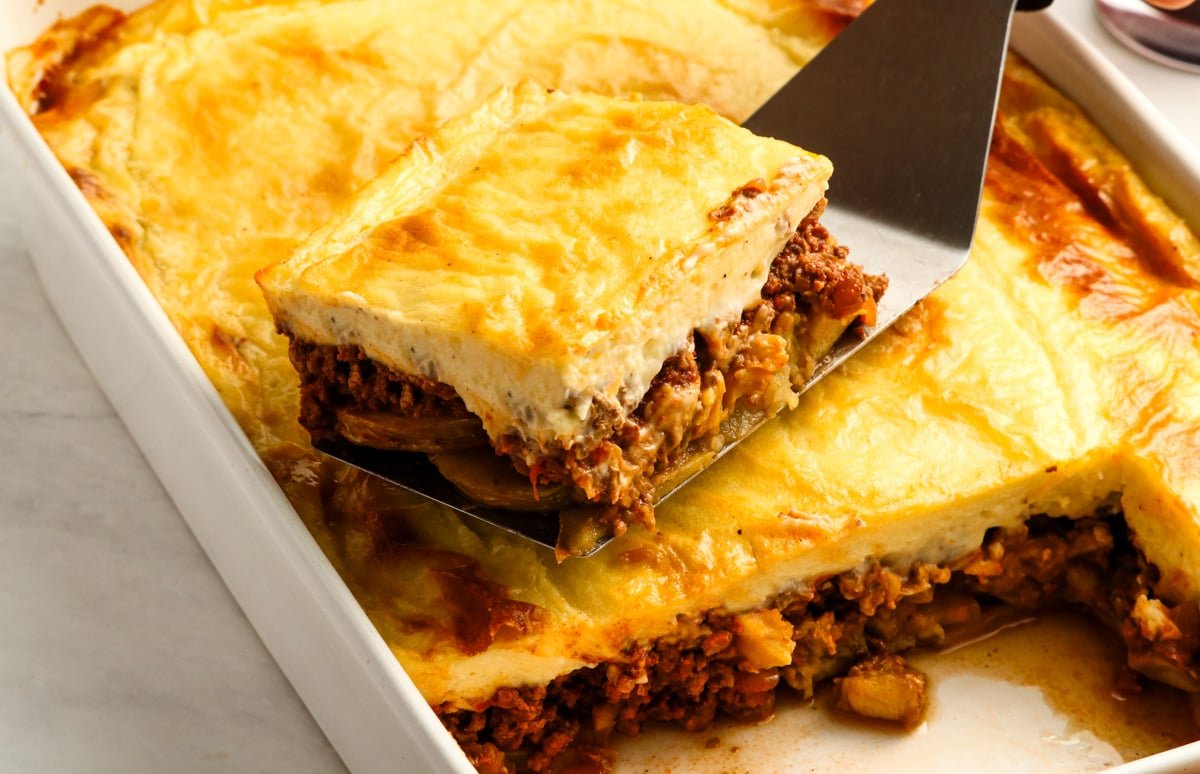Skip to content
Authentic Greek Moussaka Recipe: A Mediterranean Classic You Can Master
- Opening with a personal anecdote about the first time making moussaka.
- Touch on the significance of moussaka in Greek cuisine and celebrations.
- Briefly state how approachable the recipe is, even for beginners.
Understanding Moussaka
What is Moussaka?
- Define moussaka and its role in Mediterranean cuisine.
- Mention its variations across different cultures (Greek, Middle Eastern, etc.).
The History of Moussaka
- Brief overview of its origins.
- Its cultural significance in Greece and its evolution over time.
Essential Ingredients for Moussaka
Primary Ingredients
- Include a table for easy reading of ingredients.
| Ingredient |
Quantity |
| Eggplant |
2 large (2 lbs) |
| Yukon Gold Potatoes |
1.5 lbs |
| Ground Beef |
1.5 lbs |
| Crushed Tomatoes |
1 can (15 oz) |
| Pecorino Romano Cheese |
½ cup |
| Whole Milk |
3 cups |
| Butter |
½ cup (1 stick) |
| Flour |
⅔ cup |
| Eggs |
3 large yolks |
Key Flavor Components
- Discuss the role of spices like cinnamon, paprika, and oregano.
- Mention how each ingredient contributes to the overall flavor.
Preparation Steps for Moussaka
Step 1 – Preparing the Eggplant
- Emphasize the importance of salting the eggplant to remove moisture.
- Include a short tip on the best cutting technique.
Step 2 – Roasting the Potatoes and Eggplant
- Provide clear roasting instructions and optimal temperatures.
Step 3 – Making the Meat Sauce
- Step-by-step breakdown of creating the meat sauce.
- Include tips to prevent common mistakes.
Step 4 – Crafting the Béchamel Sauce
- Detailed instructions on making a creamy béchamel.
- Highlight the significance of the béchamel in achieving the desired texture.
Step 5 – Assembling the Moussaka
- Instructions on layering the ingredients carefully.
- Include tips for proper baking techniques and temperature.
Step 6 – Baking and Serving
- Baking time and temperature for optimal texture.
- Tips on the resting period before slicing for the best presentation.
Customizing Your Moussaka
Vegetarian Options
- Suggest substitutes for meat, such as lentils or mushrooms.
Dietary Adjustments
- Tips for gluten-free or dairy-free moussaka.
Storage and Make-Ahead Tips
Preparing in Advance
- Instructions on how to refrigerate or freeze assembled moussaka.
Reheating Guidelines
- Best practices for reheating to maintain texture.
Conclusion
- Summarize the delights of making moussaka and the joy of enjoying it with family and friends.
- Encourage readers to try the recipe and share their experiences.
Frequently Asked Questions (FAQs)
What is the origin of moussaka?
Can I substitute ground beef with another meat?
How long does moussaka last in the fridge?
Can moussaka be frozen?
What can I serve with moussaka?

